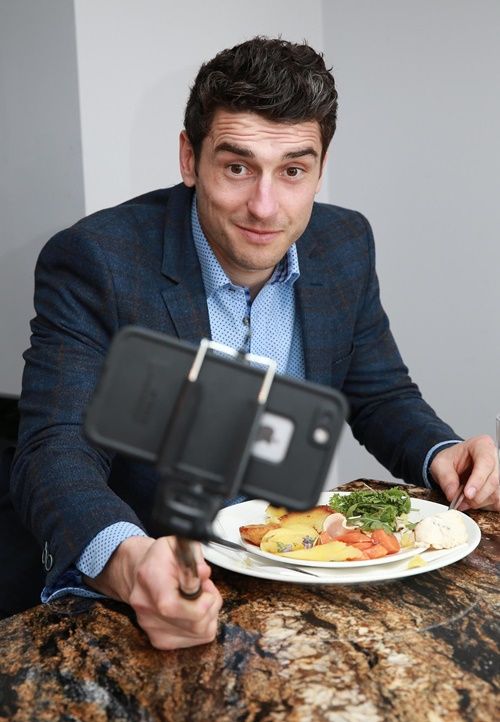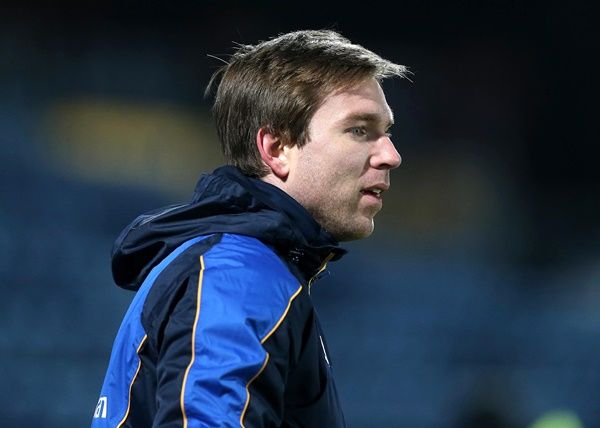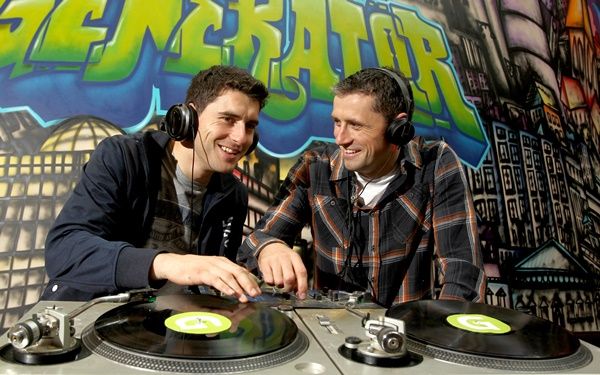

Share
24th April 2015
10:01am BST

 A fine Instagram contender there, Bernard
Before training, I'd try and have a carb snack. If I'm on the move from work to training, I'd try and get some nuts and maybe a carb bar into me, or maybe a protein shake or a smoothie.
Before a game, we'd have a carb-heavy lunch a few hours before throw-in and then, just before the match, we'd have some energy drinks and maybe some fruit for some quick releases of energy during the game.
Obviously, the carbs that you've had earlier in the day will give you a slow release of energy during the game and that's what stands to you in the last five or ten minutes, whereas the sugars that you'd have would give you the quick release of energy that some people like to have and that you need at times.
JOE: How much emphasis is placed on nutrition in an inter-county set-up like Dublin's?
BB: We spend a lot of time focusing on it because it's seen as an area that you can get massive benefits out of. We all train hard but sometimes it's the man who puts that little bit of extra effort in the kitchen who gets the rewards.
95 per cent of the time, everyone's the same, it's the extra five per cent that counts and if you've the extra energy to make another run or to go the extra mile, that's what wins games.
A lot of games are won in the last five minutes and that's when the extra energy reserves and the fuel in your body come to the fore. People sometimes overlook that but that's the business end of the game and when you need to be at your best.
JOE: Obviously, the role of the nutritionist is important but we'd imagine there's a lot of responsiblity on the individual to look after their own diet?
BB: Absolutely. Almost every evening, I'd plan and prepare my meals and snacks for the following day.
I'm often on the move in my job so if I'm in the office I can bring in my lunch. If I'm not in the office and it's a non-training day, I have to keep away from the carbs because I'm not working it off so it would be something like a salad I can knock up and have on the move.
If I am training I can cook extra for my dinner the night before and then I can have it if I'm on the move around town, because sometimes it can be difficult to find the right food depending on where you are or what meeting you're at.
It is a big challenge to stay on top of it but the benefits are there if you put the effort in, you know.
JOE: You're only human as well Bernard, so there must be times in the week when you can eat and not be worrying too much about the diet?
BB: In fairness, the day before training and big matches where we're loading up our energy reserves - we call it carb loading - you're encouraged to eat a lot of food, because it takes you 12 or 24 hours to digest your food.
Eating a big, carb-heavy dinner an hour before the game isn't going to give you energy because it'll just be sitting in your stomach so you have to time it right and Daniel Davey would advise us on that.
A fine Instagram contender there, Bernard
Before training, I'd try and have a carb snack. If I'm on the move from work to training, I'd try and get some nuts and maybe a carb bar into me, or maybe a protein shake or a smoothie.
Before a game, we'd have a carb-heavy lunch a few hours before throw-in and then, just before the match, we'd have some energy drinks and maybe some fruit for some quick releases of energy during the game.
Obviously, the carbs that you've had earlier in the day will give you a slow release of energy during the game and that's what stands to you in the last five or ten minutes, whereas the sugars that you'd have would give you the quick release of energy that some people like to have and that you need at times.
JOE: How much emphasis is placed on nutrition in an inter-county set-up like Dublin's?
BB: We spend a lot of time focusing on it because it's seen as an area that you can get massive benefits out of. We all train hard but sometimes it's the man who puts that little bit of extra effort in the kitchen who gets the rewards.
95 per cent of the time, everyone's the same, it's the extra five per cent that counts and if you've the extra energy to make another run or to go the extra mile, that's what wins games.
A lot of games are won in the last five minutes and that's when the extra energy reserves and the fuel in your body come to the fore. People sometimes overlook that but that's the business end of the game and when you need to be at your best.
JOE: Obviously, the role of the nutritionist is important but we'd imagine there's a lot of responsiblity on the individual to look after their own diet?
BB: Absolutely. Almost every evening, I'd plan and prepare my meals and snacks for the following day.
I'm often on the move in my job so if I'm in the office I can bring in my lunch. If I'm not in the office and it's a non-training day, I have to keep away from the carbs because I'm not working it off so it would be something like a salad I can knock up and have on the move.
If I am training I can cook extra for my dinner the night before and then I can have it if I'm on the move around town, because sometimes it can be difficult to find the right food depending on where you are or what meeting you're at.
It is a big challenge to stay on top of it but the benefits are there if you put the effort in, you know.
JOE: You're only human as well Bernard, so there must be times in the week when you can eat and not be worrying too much about the diet?
BB: In fairness, the day before training and big matches where we're loading up our energy reserves - we call it carb loading - you're encouraged to eat a lot of food, because it takes you 12 or 24 hours to digest your food.
Eating a big, carb-heavy dinner an hour before the game isn't going to give you energy because it'll just be sitting in your stomach so you have to time it right and Daniel Davey would advise us on that.
 Daniel Davey, pictured here in his role with Leinster Rugby, provides nutritional advice to the Dublin footballers
It's nice to be able to eat your spuds and your carbs the day before a game because before we started to get good nutritional advice, you'd nearly be afraid of eating too much before a game because you wouldn't know what you're doing.
It does take a bit of effort and time to get it right, but we get excellent advice from Daniel Davey and the team around him that we can refer to.
JOE: You've been around the Dublin panel a long time Bernard, is it right to assume that the emphasis on nutrition and its importance has increased massively since you first joined?
BB: In fairness, we had a good nutritionist before Daniel Davey called Crionna Tobin, who really changed the game under Pat Gilroy. Daniel has come in in the last couple of years and been brilliant as well. But yeah, the last few years have been a world apart compared to when I started out.
I first joined the Dublin panel in 2004 and nutrition wasn't a focus at all, it was all about putting in the miles and getting as much food into as you can, not focussing on energy foods and super foods as we do now.
JOE: You're involved with Super Valu's Good Karma campaign, which is all about sharing good food ideas and getting together with friends and family for a meal.
Do you get many opportunities to get home for a meal with the family?
BB: Yeah, my mother would have always been onto us about the need to get together around the table and have a bit of a chat and a catch up every now and then. Even now, she's very keen on it.
She'd invite myself and my two brothers around, the girlfriends and the grandchildren too; Alan has a new child now and he brings his son Jamie around as well.
It's nice to get us around the table to have a bit of craic and I always look forward to Easter and Christmas when Mam puts a big spread on and everyone comes around the kitchen table.
Daniel Davey, pictured here in his role with Leinster Rugby, provides nutritional advice to the Dublin footballers
It's nice to be able to eat your spuds and your carbs the day before a game because before we started to get good nutritional advice, you'd nearly be afraid of eating too much before a game because you wouldn't know what you're doing.
It does take a bit of effort and time to get it right, but we get excellent advice from Daniel Davey and the team around him that we can refer to.
JOE: You've been around the Dublin panel a long time Bernard, is it right to assume that the emphasis on nutrition and its importance has increased massively since you first joined?
BB: In fairness, we had a good nutritionist before Daniel Davey called Crionna Tobin, who really changed the game under Pat Gilroy. Daniel has come in in the last couple of years and been brilliant as well. But yeah, the last few years have been a world apart compared to when I started out.
I first joined the Dublin panel in 2004 and nutrition wasn't a focus at all, it was all about putting in the miles and getting as much food into as you can, not focussing on energy foods and super foods as we do now.
JOE: You're involved with Super Valu's Good Karma campaign, which is all about sharing good food ideas and getting together with friends and family for a meal.
Do you get many opportunities to get home for a meal with the family?
BB: Yeah, my mother would have always been onto us about the need to get together around the table and have a bit of a chat and a catch up every now and then. Even now, she's very keen on it.
She'd invite myself and my two brothers around, the girlfriends and the grandchildren too; Alan has a new child now and he brings his son Jamie around as well.
It's nice to get us around the table to have a bit of craic and I always look forward to Easter and Christmas when Mam puts a big spread on and everyone comes around the kitchen table.
 Bernard and Alan Brogan make sure to 'mix' with the family around the dinner table on a regular basis
That's what we're going after with Super Valu, to try and promote that. Research in the Super Valu Home Truths report has shown that people feel the power of having meals together and it's good to see that they can put down their phones, turn off the TV for a few minutes have a little chat.
JOE: A few quick questions to finish off Bernard...
God forbid you'd ever be on death row but if you were what would be your last meal request?
BB: My favourite dinner is probably Christmas dinner. The turkey, ham, sausage stuffing, gravy, a load of roast potatoes, roast veg, croquettes, I'd eat that all day. If I had to pick one meal, it would be my mother's Christmas dinner.
What's your biggest weakness when it comes to food?
BB: I'm a jelly man. Fizzy jellies. If I'm going to the cinema I find it hard to walk past the pick n' mix, that's my guilty pleasure that I treat myself to every now and again when the time is right.
Who are the best and worst cooks on the Dublin panel?
BB: The best cook would probably be Tommo (Tomás) Brady. He's a man that puts massive effort into his meals and into planning his food before training and he's in good shape for it.
The worst cook would be (long pause), I'll say Michael Darragh MacAuley.
He's forever floating around town, wining and dining, eating in nice places and eating nice food so I'll probably say him.
He uses up more energy than most getting up and down the pitch so he can eat whatever he likes really!
Bernard Brogan was speaking at the launch of SuperValu's Good Food Karma campaign, which is all about sharing good food ideas to create great moments.
Start a Good Food Karma circle, follow @SuperValuIRL and join in the conversation #goodfoodkarma
For more information, click here.
Bernard and Alan Brogan make sure to 'mix' with the family around the dinner table on a regular basis
That's what we're going after with Super Valu, to try and promote that. Research in the Super Valu Home Truths report has shown that people feel the power of having meals together and it's good to see that they can put down their phones, turn off the TV for a few minutes have a little chat.
JOE: A few quick questions to finish off Bernard...
God forbid you'd ever be on death row but if you were what would be your last meal request?
BB: My favourite dinner is probably Christmas dinner. The turkey, ham, sausage stuffing, gravy, a load of roast potatoes, roast veg, croquettes, I'd eat that all day. If I had to pick one meal, it would be my mother's Christmas dinner.
What's your biggest weakness when it comes to food?
BB: I'm a jelly man. Fizzy jellies. If I'm going to the cinema I find it hard to walk past the pick n' mix, that's my guilty pleasure that I treat myself to every now and again when the time is right.
Who are the best and worst cooks on the Dublin panel?
BB: The best cook would probably be Tommo (Tomás) Brady. He's a man that puts massive effort into his meals and into planning his food before training and he's in good shape for it.
The worst cook would be (long pause), I'll say Michael Darragh MacAuley.
He's forever floating around town, wining and dining, eating in nice places and eating nice food so I'll probably say him.
He uses up more energy than most getting up and down the pitch so he can eat whatever he likes really!
Bernard Brogan was speaking at the launch of SuperValu's Good Food Karma campaign, which is all about sharing good food ideas to create great moments.
Start a Good Food Karma circle, follow @SuperValuIRL and join in the conversation #goodfoodkarma
For more information, click here.Explore more on these topics:

Sports | Joe.ie
sport